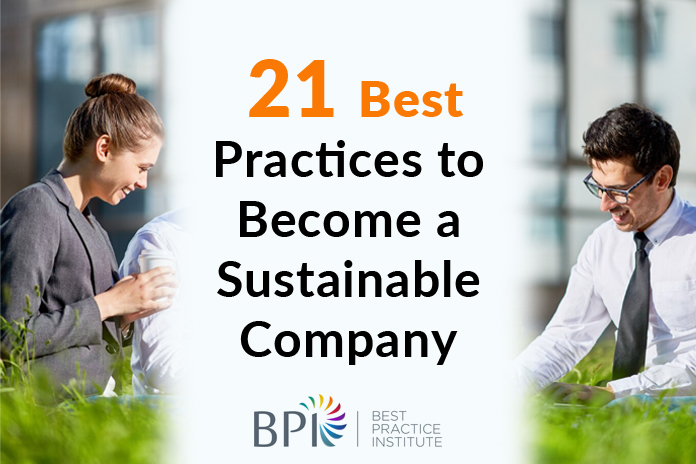In an era where environmental stewardship is not just a buzzword but a vital business imperative, companies increasingly recognize the need to adopt sustainable practices. Building a sustainable company is not just about environmental responsibility; it’s about creating a socially responsible, economically viable, and environmentally conscious business.
This article explores 21 best practices companies can embrace to become sustainability leaders, focusing on eco-friendly initiatives, corporate sustainability strategies, and environmental responsibility in business.
1. Make Sustainability Your Mission
Infusing sustainability into the core mission of your business is the foundational step. A clear and concise sustainability mission statement can guide your company’s practices, values, and priorities. This statement becomes a commitment to incorporating eco-friendly initiatives at every level.
By aligning your organizational goals with environmental stewardship, you contribute to a sustainable future and foster a sense of purpose among your employees. This shared commitment can be a powerful motivator, driving innovative solutions and creating a positive impact beyond your business operations.
2. Create Green Products from the Start
If sustainability is part of your business’s DNA, consider creating products with eco-friendly design in mind. Prioritize materials that are sustainably sourced, fair trade, recyclable, renewable, and locally available. This approach not only benefits the environment but also attracts conscious consumers.
3. Sustainable Storage and Shipping Practices
Extend your commitment to sustainability by storing and shipping your products—warehouse goods in facilities that use renewable energy and package products in reusable or recyclable materials. The emphasis should be on reducing the carbon footprint associated with your supply chain.
4. Green Practices for Service-Based Companies
Even service-oriented businesses can contribute to sustainability. For instance, construction companies can adopt fuel-efficient equipment, minimize water usage, and implement effective waste management practices. VLS Environmental Solutions offers services for solid waste recycling and chemical recycling to support these initiatives.
5. Environmentally Conscious Back Office Operations
Sustainability should not be limited to consumer-facing operations. Implement energy-efficient measures, reduce waste, and encourage a paperless environment in your office. Every aspect of your business, including the back office, contributes to sustainability.
6. Charitable Giving and Community Support
Engage in charitable giving that aligns with sustainability goals. Donating surplus products, supporting environmental conservation programs, and integrating philanthropy into your business model can positively impact your community and the planet.
7. Encourage Remote Work for Energy Efficiency
Supporting remote work not only reduces energy consumption in offices but also minimizes employees’ carbon footprint associated with commuting. Reducing paper usage and disposable items in office spaces complements this eco-friendly practice.
8. Opt for Green Office Supplies
Choosing environmentally friendly office supplies, such as recycled paper, biodegradable utensils, and eco-friendly cleaning products, demonstrates a commitment to sustainability in even the most minor aspects of business operations.
9. Embrace Recycling and Reuse
Implementing effective recycling programs in offices and manufacturing facilities is crucial. Businesses should encourage recycling at the individual level and explore ways to repurpose materials, reducing their reliance on new resources.
10. Donate Surplus Goods
Companies often accumulate surplus goods or promotional materials. Instead of discarding them, consider donating to organizations in need. It not only minimizes waste but also contributes to social responsibility.
11. Waste Reduction Strategies
The most sustainable approach to waste management is waste reduction. Companies can achieve this by adopting paperless practices, investing in longer-lasting equipment, and utilizing industry best practices to minimize excess material usage.
12. Prioritize Energy Efficiency
Improving energy efficiency reduces operational costs and lowers the carbon footprint. Strategies include:
- Upgrading insulation.
- Using LED bulbs.
- Opting for energy-efficient equipment.
- Transitioning to a fuel-efficient fleet.
13. Conserve Water Resources
Conserving water is integral to sustainable business practices. Implementing low-flow faucets, toilets, and urinals, along with efficient landscaping practices, contributes to cost savings and environmental conservation.
14. Safe Chemical Management
Companies should prioritize the use of eco-friendly and EPA-approved chemicals. Safely manage industrial chemical waste by collaborating with specialized services like VLS Environmental Solutions.
15. Evaluate and Audit Current Practices
To improve sustainability, businesses must first evaluate their current practices. Conducting audits on energy consumption, waste generation, and supply chain practices provides a baseline for improvement.
16. Formalize Sustainability Plans
Incorporate sustainability into the company’s formal plan with time-bound goals, specific strategies, and accountability measures. Formalizing these plans ensures a structured approach to sustainable practices.
17. Start Small and Scale Up
Starting with small, achievable programs for businesses new to sustainability efforts helps build momentum and employee buy-in. Scaling up gradually allows for smoother implementation and adaptation.
18. Employee Engagement in Sustainability
Engage employees in sustainability initiatives by seeking their input, implementing their ideas, and creating incentives for eco-friendly practices. Turning sustainability into challenges fosters a sense of shared responsibility.
19. Maintain Credible, Sustainable Business Certification
Achieving and maintaining recognized sustainability certifications demonstrates a commitment to transparency and continual improvement. It assures customers and stakeholders that the business follows the highest sustainability standards.
20. Explore Innovative Technologies
Constantly seek innovative technologies that can enhance sustainability efforts. Whether it’s energy-efficient machinery, sustainable packaging materials, or eco-friendly production processes, embracing innovation keeps the company at the forefront of sustainability.
21. Apply for Recognition and Excellence Awards
Seek external validation for sustainability efforts by applying for awards and certifications. Newsweek’s Excellence 1000 Company is an exemplary platform recognizing excellence in sustainability, social responsibility, and industry leadership.
Final Word
Transforming a company into a sustainability champion requires a holistic and committed approach. By adopting eco-friendly initiatives and corporate sustainability strategies and demonstrating environmental responsibility in business operations, companies can become leaders in the quest for a more sustainable future.
Businesses are encouraged to apply for recognition through Newsweek’s Excellence 1000 Company, a prestigious acknowledgment of excellence in sustainability, social responsibility, customer service, and industry leadership. Embrace sustainability not just as a corporate responsibility but as a journey towards creating a positive impact on the planet and society.










